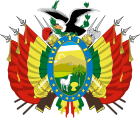
The politics of Bolivia takes place in a framework of a presidential representative democratic republic, whereby the president is head of state, head of government and head of a diverse multi-party system. Executive power is exercised by the government. Legislative power is vested in both the government and the two chambers of parliament. Both the Judiciary and the electoral branch are independent of the executive and the legislature. After the 2014 election, 53.1% of the seats in national parliament were held by women, a higher proportion of women than that of the population.

The President of Bolivia, officially known as the President of the Plurinational State of Bolivia, is head of state and head of government of Bolivia and the Captain General of the Armed Forces of Bolivia.

Elections in Bolivia gives information on elections and election results in Bolivia.

The current Constitution of Bolivia came into effect on 7 February 2009 when it was promulgated by President Evo Morales, after being approved in a referendum with 90.24% participation. The referendum was held on 25 January 2009, with the constitution being approved by 61.43% of voters.

The Vice President of Bolivia, officially known as the Vice President of the Plurinational State of Bolivia, is the second highest political position in Bolivia. The vice president replaces the president in his definitive absence or others impediment and is the President of the Legislative Assembly.
Recognition of same-sex unions in the Americas is widespread, with a majority of people in both North America and South America living in jurisdictions providing marriage rights to LGBT citizens.
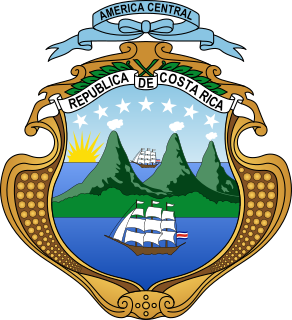
The Supreme Court of Costa Rica is the court of greater hierarchy of Law and Justice in Costa Rica.

Lesbian, gay, bisexual, and transgender (LGBT) people in Bolivia may face legal challenges not experienced by non-LGBT residents. Both male and female same-sex sexual activity are legal in Bolivia. The Bolivian Constitution bans discrimination on the basis of sexual orientation and gender identity, making Bolivia one of the only few countries in the world to have such constitutional protections for LGBT people. In 2016, Bolivia passed a comprehensive gender identity law, seen as one of the most progressive laws relating to transgender people in the world. Following a decision from the Inter-American Court of Human Rights in January 2018, recognising same-sex marriage as a right under the American Convention on Human Rights and which set binding precedent for Bolivian courts, and pending a decision from the Plurinational Constitutional Court, the Civil Registry Service announced its intention on 9 December 2020 to issue civil union certificates offering all of the legal rights, benefits and responsibilities of marriage to same-sex couples.
Bolivia has recognised same-sex civil unions since 9 December 2020.
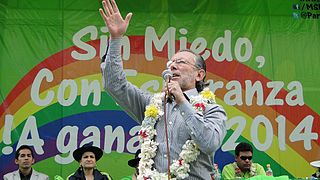
Juan Fernando del Granado Cosío is a Bolivian human-rights lawyer and politician, mayor of La Paz (2000–2010) and founder of the Movement without Fear, a progressive political party. On November 11, 2013, he officially announced his candidacy for president of Bolivia for the 2014 election.

Bolivia has had seventeen constitutions, including the present one, since its foundation in 1825.

The Federal Constitution of the United Mexican States of 1857 often called simply the Constitution of 1857 is the liberal constitution drafted by 1857 Constituent Congress of Mexico during the presidency of Ignacio Comonfort. It was ratified on February 5, 1857, establishing individual rights such as freedom of speech; freedom of conscience; freedom of the press; freedom of assembly; and the right to bear arms. It also reaffirmed the abolition of slavery, eliminated debtor prison, and eliminated all forms of cruel and unusual punishment, including the death penalty. It was designed to guarantee a weak central government through federalism, created a strong legislature and an independent judiciary, and a weak executive in order to prevent dictatorship. Liberal ideology of the centrality of private property and suspicion of ownership of property, that is, indigenous communities and the Catholic Church saw the Ley Lerdo incorporated into the constitution.
The first Bolivian judicial election was held on 16 October 2011. The national vote was held to elect magistrates to serve on the Supreme Court of Justice, the Plurinational Constitutional Court, the Agro-environmental Court and members of the Judiciary Council. It was originally scheduled to be held on 5 December 2010, but officials of the National Electoral Court and of the MAS majority in the Plurinational Legislative Assembly delayed it. The vote will be the first time that a Latin American country directly elects its highest judicial officials.
Law of the Rights of Mother Earth is a Bolivian law, that was passed by Bolivia's Plurinational Legislative Assembly in December 2010. This 10 article law is derived from the first part of a longer draft bill, drafted and released by the Pact of Unity by November 2010.
The Plurinational Electoral Organ is the independent electoral branch of the government of Bolivia. It replaced the National Electoral Court in 2010.
The Supreme Court of Justice is the highest court of ordinary jurisdiction in Bolivia, based in Sucre. Its powers are set out in Articles 181–185 of the 2009 Constitution and the Law of the Judicial Organ. It was first seated on 2 January 2012.
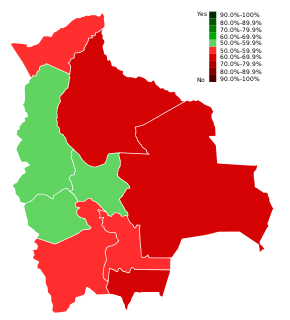
A constitutional referendum was held in Bolivia on Sunday, 21 February 2016. The proposed constitutional amendments would have allowed the president and vice president to run for a third consecutive term under the 2009 Constitution. The referendum was voted down by a 51.3% majority.
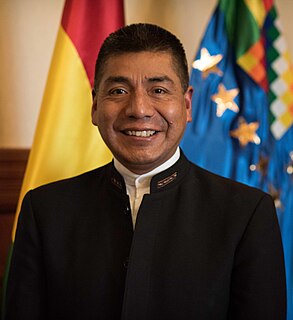
Fernando Huanacuni Mamani is a Bolivian politician, lawyer and researcher. He served as the Foreign Minister of Bolivia from 2017 to 2018.
The law of Bolivia includes a constitution and a number of codes.
